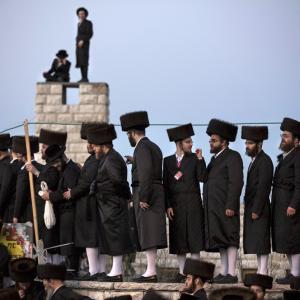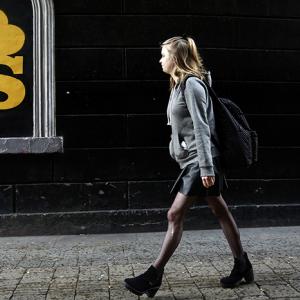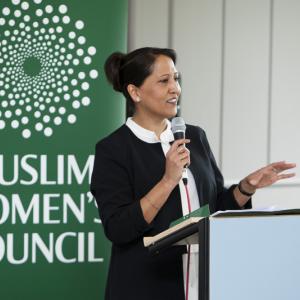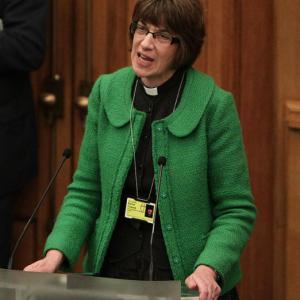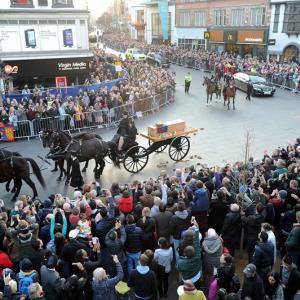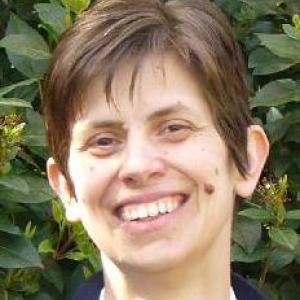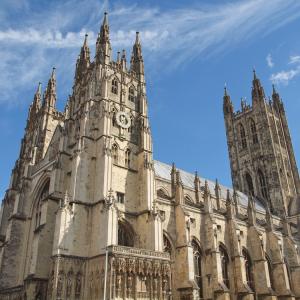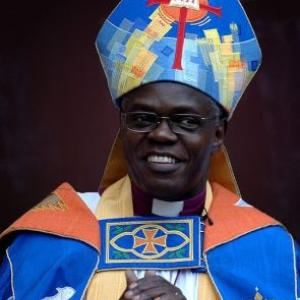Posts By This Author
First Church of England Bishop Comes Out As Gay
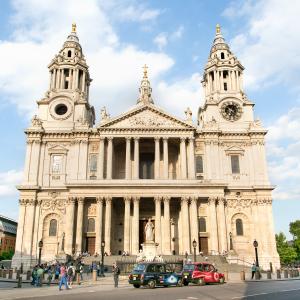
Giovanni G/Shutterstock.com
Nicholas Chamberlain, the bishop of Grantham, has come out as the first Church of England bishop to openly acknowledge he is gay. Chamberlain, 52, said in an interview with the Guardian published Sept. 2 that he is living with a man and in a long term loving relationship, though it does not involve sex.
The Guardian predicted that Chamberlain’s announcement “will be embraced by campaigners for equality but is likely to alarm conservatives who fear the church is moving away from traditional teachings.”
Scottish Episcopal Church Takes First Step Toward Gay Marriage
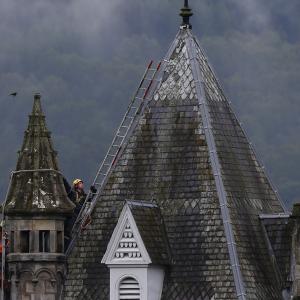
Image via REUTERS/Russell Cheyne/RNS
The Scottish Episcopal Church may become the first major church in the United Kingdom to allow its clergy to conduct same-sex weddings in churches.
The General Synod of the Scottish Episcopal Church, meeting in the Scottish capital, Edinburgh, passed on first reading a change to its canon law definition of marriage June 10.
Church of Scotland to Consider Online Baptisms, Communion

Image via Goncharuk Maksim / Shutterstock.com
The Church of Scotland will launch a two-year investigation into the possibility of introducing online baptisms, Communion, and other Christian sacraments.
The church, known as The Kirk, has seen its rolls fall by almost one-third between 2004 and 2015, to just under 364,000 members.
Londoners Elect Sadiq Khan as First Muslim Mayor
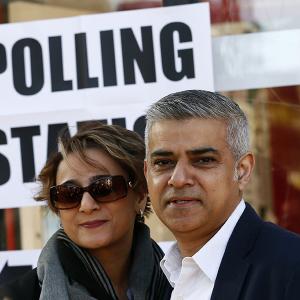
Sadiq Khan with his wife Saadiya. Image via REUTERS/Stefan Wermuth/RNS
Londoners have elected the son of a Pakistani-born London bus driver as their mayor, making him the first Muslim to govern this city of 8.5 million residents. Sadiq Khan, a 45-year-old Labour Party member, trounced his opponent, the Conservative Party’s Zac Goldsmith, 41, a well-known writer on ecological affairs and son of one of Britain’s wealthiest Jewish businessmen.
Welby Praised for 'Honesty' Over Paternity Shocker
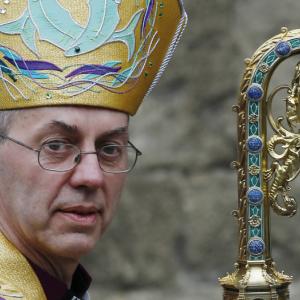
Archbishop Justin Welby. Image via REUTERS/Luke MacGregor/RNS
British religious leaders are praising the Archbishop of Canterbury Justin Welby for responding with “steadiness and honesty” to the stunning news that his biological father was not his mother’s husband. The revelation was expected to bring the image of the elite-educated primate closer to the people.
Survey: Majority of People in Scotland Have No Religion
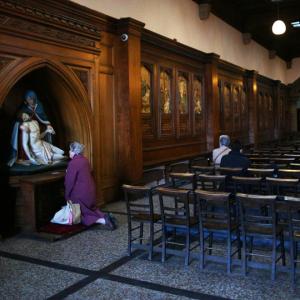
Image via REUTERS/David Moir/RNS
More than half of the 5.4 million people living in Scotland have no religion, according to a survey published by Scottish Social Attitudes.
Charismatic Movement Thrives as Church of England Sputters
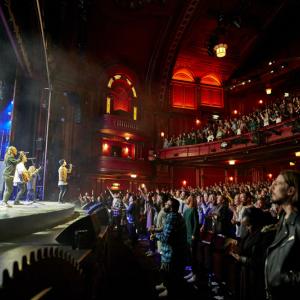
Image via Hillsong Church London / RNS
Church closings are nothing new in the United Kingdom.
In the past six years, 168 Church of England churches have closed, along with 500 Methodist and 100 Roman Catholic churches.
“Christianity in Britain has seen a relentless decline for over 100 years,” says Linda Woodhead, a sociologist at Lancaster University.
Anglican Leaders Downplay Censure of Episcopal Church

Archbishop Justin Welby with protesters. Image via REUTERS/Toby Melville/RNS
The Anglican Communion’s worldwide leaders, finishing up four days of heated discussions, sought to project a sense of unity despite a move to exclude the Episcopal Church from key policy decisions over the American province’s acceptance of same-sex marriage. The Archbishop of Canterbury, Justin Welby, overall leader of the global body, stressed at a news conference on Jan. 15 that the church had chosen to remain together, albeit effectively as a house divided.
As Anglican Leaders Gather, Future of Denomination in Question
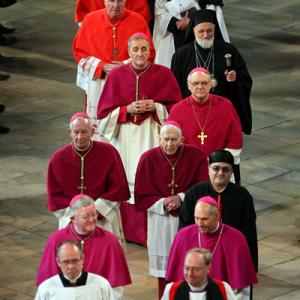
Image via Anglican Communion News Service / The Press Association / RNS
Various factions within the Anglican Communion are jockeying for position as bishops of the world’s third-largest Christian tradition gather in Canterbury for the start of a six-day meeting to discuss the future of their communion.
But averting a split may not be possible.
Critics Outraged by British Theater's Cancellation of Play About Muslim Radicalization
Prominent artists and human rights campaigners have criticized the National Youth Theatre in London for canceling a play because its theme is the radicalization of young British Muslims and their attraction to terrorist organizations such as the militant Islamic State group.
There is growing concern the play, Homegrown — by British–born Omar El-Khairy — was shut down before its scheduled opening on Aug. 15 because of pressure from the British police.
A report in The Times by Jack Malvern, the paper’s arts correspondent, quoted Nadia Latif, the play’s director, saying the police had asked to see the final script of Homegrown before the play opened at a school in Brixton, a part of South London with a large Muslim community.
All-Day Sunday Shopping May Be in the Cards in Britain
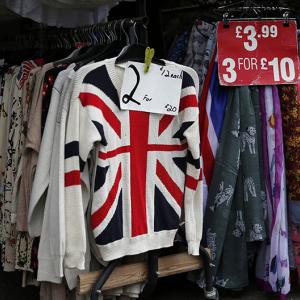
Pricing signs hang on clothing outside a shop in London on June 3, 2015. Photo via REUTERS / Suzanne Plunkett / RNS
The move would bring London into line with Paris and New York, where no restrictions on Sunday shopping exist.
Strict anti-Sunday shopping laws came into being in the 19th century, under Queen Victoria.
In 1986, Prime Minister Margaret Thatcher tried to do away with them but she met stiff opposition from traditionalists and Christian churches.
Two decades later a compromise was reached, and most shops are now allowed to open for six hours on Sunday.
British Jews Object to Ultra-Orthodox Sect’s Decree Banning Women from Driving
Two prominent leaders of England’s Jewish community and a representative of the chief rabbi have joined in repudiating rabbis from an ultra-Orthodox Jewish sect in London that have banned women from driving.
Rabbis from the small Belz community have decreed that as of August children would not be allowed to study if their mothers drive them to school.
The decree was motivated out of a desire to keep “the traditional rules of modesty in our camp,” the rabbis said, according to a report in The Jewish Chronicle.
Ireland’s Gay Marriage Referendum a Sign of Roman Catholic Decline
“In Ireland,” says a character in a 1904 George Bernard Shaw play, “the people is the Church, and the Church is the people.”
But not so much anymore.
On May 22, voters in this once deeply Roman Catholic country will decide whether the country’s constitution should be amended to allow for gay marriage. If the amendment passes, Ireland will become the first country to legalize same-sex civil marriage by popular vote.
Plans Announced for England’s First Women-Only Mosque
The country’s first women-only mosque will open in Bradford, a 19th-century industrial boomtown and one of the most heavily Muslim-populated cities in the U.K., the Muslim Women’s Council announced.
The plan seeks to provide women with a platform where they can play a larger role in the religious life of their community, a role that would include women leading prayers on Fridays and the introduction of female imams.
Church of England Loses No Time, Appoints Third Woman Bishop and First to Oversee a Diocese
The Church of England’s commitment to advance the cause of women took another step forward March 26 with the appointment of Rachel Treweek, 52, as the next Bishop of Gloucester in the southwest region of England.
That makes three women bishops in the space of three months since the church overcame its long-standing opposition to women bishops late last year. On March 25, the church appointed its second woman bishop, Alison White, 58, as suffragan bishop of Hull.
But Thursday’s announcement was even more dramatic. Treweek will be the first to run a diocese on her own. She will be one rank below archbishop and will become the first woman bishop to sit in the House of Lords, the British Parliament’s Upper House.
Twenty-six “Lords Spiritual” — all Anglican, all male — sit in the House of Lords.
In a statement, Treweek said the appointment was “an immense joy and privilege.”
Catholics and Anglicans Prepare Ecumenical Burial Fit for a King
Tens of thousands of people in Leicester — England’s most religiously diverse city — are getting ready to honor the memory of a long-despised English king with a ceremony that testifies to the already warm relationship between the Church of England and the Roman Catholic Church.
The bones of King Richard III — who was slain in battle in 1485 and vilified in the writings of William Shakespeare, who described him as a “poisonous bunch-back’d toad” — will be interred at Leicester Cathedral on March 26 at a ceremony led by Archbishop of Canterbury Justin Welby and attended by leading Catholics, Buddhists, Hindus, Sikhs, and Jews, as well as members of England’s royal family.
Richard was the last king of England to die in battle while attempting to defend his throne from Henry VII. The latter went on to establish the Tudor dynasty, whose most memorable monarch was Henry VIII.
After the battle, Richard’s remains were hastily buried by Franciscan monks. In 2012, archaeologists digging in a parking lot found his remains and had the DNA checked with a known survivor of the king’s family.
British Ponder Charitable Tax Relief Status of Controversial Exclusive Brethren Schools
Schools run by a conservative Christian sect called the Exclusive Brethren are under investigation following claims by former teachers that they were required to use science textbooks with pages ripped out, prevent boys and girls from talking to one another outside classrooms, and tolerate bullying, racism, and homophobia.
Life at Britain’s 34 Brethren schools is under the microscope following a decision last year to grant them charity status, which allows the group to avoid taxes estimated to be worth millions of pounds every year.
The Exclusive Brethren includes about 17,000 members across England.
After their first bid for charitable status was rejected, the sect fought back with supporters writing thousands of letters to the Charity Commission, which regulates charities in England and Wales.
The sect’s leader is an Australian named Bruce Hales (followers call him “the Prophet”).
Over 200 members of Parliament supported the Brethren’s charity status. But new disclosures have changed the public image of the group.
Eight former teachers have spoken to the media and described school buses segregated by gender, classroom racism, and textbooks with pages on evolution, fossil fuels, and sexual reproduction ripped out.
Church of England Names Its First Woman Bishop; Libby Lane to Assume Historic Role
The Church of England announced on Dec. 17 that Libby Lane, a parish priest from Hale, a small village outside Manchester, would become its first woman bishop, ending centuries of all-male leadership in this country’s established church.
The announcement from Downing Street, the prime minister’s official residence in London, came just a month after changes to canon law making it possible for women to assume the role of suffragan and diocesan bishops.
Lane, 48, a mother of two and the wife of an Anglican vicar, will be consecrated as the eighth bishop of Stockport, in the Diocese of Chester, at a ceremony at York Cathedral on Jan. 26. Her appointment is as a suffragan bishop — a bishop subordinate to a metropolitan or diocesan bishop.
On her surprise appointment, she said: “This is unexpected and very exciting. I’m honored and thankful to be called to serve as the next bishop of Stockport and not a little daunted to be entrusted with such a ministry.”
Archbishop Justin Welby: Anglican Communion May Not Hold Together
In a lengthy interview in The Times of London, Archbishop of Canterbury Justin Welby predicted that the Anglican Communion might not hold together because of strong disagreements on the ordination of women as bishops and full rights for LGBT people.
The candid interview came at the end of Welby’s visits to the 38 provinces (or country-states) that make up the Anglican Communion.
Welby said that although individual churches remain “strong, resilient and thriving,” the differences among them remain profound.
“I think, realistically, we‘ve got to say that despite all efforts there is a possibility that we will not hold together, or not hold together for a while,” he said. “I could see circumstances in which there could be people moving apart and then coming back together, depending on what else happens.”
Rod Thomas, chairman of Reform, an evangelical network of English and Irish Anglicans opposed to women bishops and LGBT ordination or unions, agreed with the archbishop’s assessment.
“If, as an Anglican, you believe more or less the same things but you just can’t reach agreement on something that is terribly divisive, you do go your separate ways. That will mean that the heads of various Anglican churches around the world won’t be able to meet together and say ‘Look, we’re all united’ in the same way they did in the past.”
Church of England Formally Approves Women Bishops
Twenty years after women were ordained as priests, the Church of England is set to appoint its first woman bishop by year’s end or at the start of 2015.
On Nov. 17, the church’s two most senior leaders, Archbishop of Canterbury Justin Welby and Archbishop of York John Sentamu, signed the change into church, or canon, law after asking the General Synod, made up of bishops, clergy and laity, to signal their approval by a show of hands.
The shattering of what’s called “the Church of England’s stained-glass window” marks the culmination of years of campaigning for reform.
In July, the synod, voted overwhelmingly in favor of legislation to create women bishops.
Hilary Cotton, chairwoman of Women and the Church, an advocacy organization, told reporters she is now hopeful the reform will lead to “changing the culture of the church.”
U.S.–born Christian Rees, a member of the synod’s House of Laity, said the Nov. 17 ceremony would change the public perception that the Church of England has “a problem with women.”

